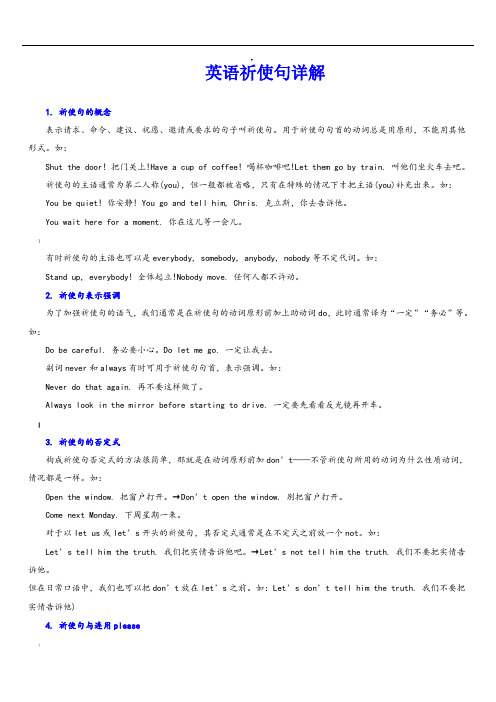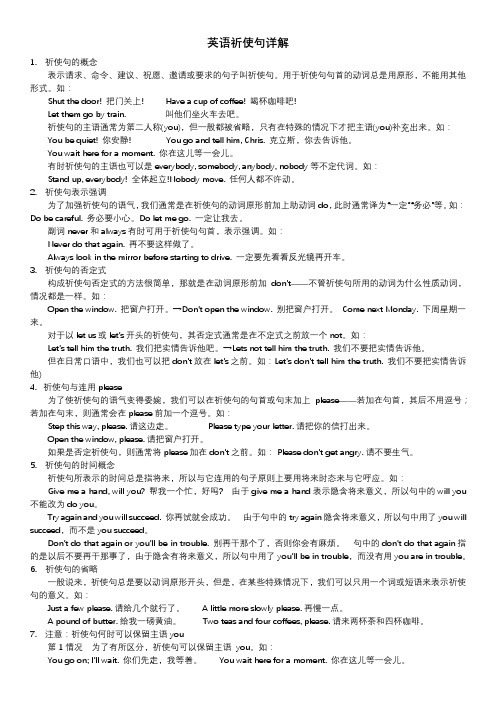(完整版)初中英语祈使句讲解及练习
祈使句的结构及用法(附练习题与答案)

• 4. No+/名词以上结构表示禁止,多用于公共场合的标牌或警示语。
• 例如:No littering.禁止乱扔垃圾。
•
No photo.禁止拍照。
• 注意:为了加强祈使句的语气,我们通常在祈使句的动词原形前加上助动词do,此时译为“一定,务必”。例 如:Do lock the door.务必要锁上门。Do write carefully. 一定要仔细写。巧记口诀祈使句巧记口诀祈使句 无主语,主语you常省去;动词原形在句首,加上please较客气。变为否定很容易,句首don't莫忘记。
• 3. Let型(1)肯定句: Let+宾语+动词原形+其他成分。
• 例如:Let me help you.让我来帮你。
• (2)否定句:don't+let+动词原形+其他成分。或Let+宾语+not+动词原形+其他成分。
• 例如:don't let her cross the street alone.= Let her not cross the street alone.不要让她单独过马路。
祈使句
• 祈使句的种类 • 1. Do型 • (1)肯定句:动词原形(+宾语)+其他成分。 • 例如:Open the door.开门。 • Please have a seat here.请这边坐。 • (2)否定句:don't+动词原形(+宾语)+其他成分。 • 例如:don't watch TV. 不要看电视。 • 2. Be型 • (1)肯定句:Be+表语(名词或形容词)+其他成分。 • 例如: Be a good boy!要做一个好孩子!Be quite, please!请安静! • (2)否定句:don't be+表语。例如:don't be late.不要迟到。
初中7年级下册英语祈使句精讲及练习集锦

祈使句精讲及练习一、祈使句(Imperative Sentence)定义:用于表达命令、请求、劝告、警告、禁止等的句子叫做祈使句,祈使句最常用于表达命令,因此在学校文法中也常称为命令句。
祈使句因对象(即主语)是第二人称,所以通常都省略。
祈使句的动词都为一般现在时,句末则使用句号来表示结束。
例:go and wash your hands. (去洗你的手。
;命令)Be quiet, please.(Please be quiet.)(请安静。
;请求)Be kind to our sister. (对姊妹要和善。
;劝告)Watch your steps. (走路小心。
;警告)Look out!Danger!(小心!危险!;强烈警告,已如感叹句)Keep off the grass. (勿践草坪。
;禁止)No parking. (禁止停车。
;禁止)祈使句也常把主语You表达出来,使对方听起来觉得柔和些,例如:You go and tell him, Chris. (克立斯你去告诉他。
)二、相关口令祈使句无主语,主语you常省去;动词原形谓语当,句首加don't否定变;朗读应当用降调,句末常标感叹号。
三、表现形式●肯定结构:1. Do型(即:动词原形(+宾语)+其它成分)。
如:Please have a seat here. 请这边坐。
有的祈使句在意思明确的情况下,动词可省略。
如:This way, please. = Go this way, please. 请这边走。
2. Be型(即:Be + 表语(名词或形容词)+其它成分)。
如:Be a good boy! 要做一个好孩子!3. Let型(即:Let + 宾语+ 动词原形+ 其它成分)。
如:Let me help you. 让我来帮你。
●否定结构:1. Do型和Be型的否定式都是在句首加don't构成。
如:Don't forget me! 不要忘记我!Don't be late for school! 上学不要迟到!2. Let型的否定式有两种:“Don't + let + 宾语+ 动词原形+ 其它成分;和Let + 宾语+ not + 动词原形+ 其它成分。
初中语法祈使句专项讲解

英语祈使句详解1. 祈使句的概念表示请求、命令、建议、祝愿、邀请或要求的句子叫祈使句。
用于祈使句句首的动词总是用原形,不能用其他形式。
如:Shut the door! 把门关上!Have a cup of coffee! 喝杯咖啡吧!Let them go by train. 叫他们坐火车去吧。
祈使句的主语通常为第二人称(you),但一般都被省略,只有在特殊的情况下才把主语(you)补充出来。
如:You be quiet! 你安静! You go and tell him, Chris. 克立斯,你去告诉他。
You wait here for a moment. 你在这儿等一会儿。
)有时祈使句的主语也可以是everybody, somebody, anybody, nobody等不定代词。
如:Stand up, everybody! 全体起立!Nobody move. 任何人都不许动。
2. 祈使句表示强调为了加强祈使句的语气,我们通常是在祈使句的动词原形前加上助动词do,此时通常译为“一定”“务必”等。
如:Do be careful. 务必要小心。
Do let me go. 一定让我去。
副词never和always有时可用于祈使句句首,表示强调。
如:Never do that again. 再不要这样做了。
Always look in the mirror before starting to drive. 一定要先看看反光镜再开车。
|3. 祈使句的否定式构成祈使句否定式的方法很简单,那就是在动词原形前加don’t——不管祈使句所用的动词为什么性质动词,情况都是一样。
如:Open the window. 把窗户打开。
→Don’t open the window. 别把窗户打开。
Come next Monday. 下周星期一来。
对于以let us或let’s开头的祈使句,其否定式通常是在不定式之前放一个not。
(完整版)初中英语祈使句讲解及练习

(完整版)初中英语祈使句讲解及练习初中英语――祈使句祈使句指的是表示命令、请求、建议或劝告的句子。
其主语you 常省略,谓语动词用原形,句末用感叹号或句号,读降调。
1. 肯定的祈使句(1)动词原形 +其他Stand up, please. = Please stand up. 请起立。
(2)Be + n./adj.Be a good boy! 要做一个好孩子 ! Be careful! = Look out! = Take care! 小心 / 当心!(3)Let + 宾语 + 动词原形 + 其它成分Let me help you.让我来帮你。
Let ' s go to school together.咱们一起上学去吧。
2. 否定的祈使句(1) Don't + 动词原形Don't stand up. 别站起来。
Don't be careless. 别粗心。
Don't let them play with fire. 别让他们玩火。
(2) Let 型的否定式有两种:“Don't + let + 宾语 + 动词原形 + 其它成分”和“ Let + 宾语 + not +动词原形 + 其它成分” 。
Don't let him go. / Let him not go. 别让他走。
Let them not play with fire. 别让他们玩火。
(3) no 开头 ,用来表示禁止性的祈使句。
No smoking! 禁止吸烟 !No fishing! 禁止钓鱼 !3. 祈使句的强调形式,通常在肯定祈使句式前加上助动词 Do 。
例如: Do shut up! 快住口!4. 祈使句的回答祈使句的动作通常是表示将来发生的动作,所以回答祈使句时,一般用 will 或won ' t 。
在回答具有否定意义的祈使句时,要注意两点:1)形式一致(即Yes 与will 保持一致;No 与won ' t 保持一致)2)意思相反(即 Yes 是“不”的意思; No 是“是”的意思)。
(完整word版)英语祈使句详解

Step this way, please. 请这边走。Please type your letter. 请把你的信打出来。
Someone fetch a pail of water. 谁去打一桶水来。
3.有关祈使句最可能涉及的考点是:祈使句带主语以及“祈使句+and / then / or+陈述句”这一句型(祈使句表示条件)。另外,祈使句与反意疑问句一起考查也是高考一大特点。如:
英语祈使句详解
1.祈使句的概念
表示请求、命令、建议、祝愿、邀请或要求的句子叫祈使句。用于祈使句句首的动词总是用原形,不能用其他形式。如:
Shut the door! 把门关上!Have a cup of coffee! 喝杯咖啡吧!
Let them go by train.叫他们坐火车去吧。
祈使句的主语通常为第二人称(you),但一般都被省略,只有在特殊的情况下才把主语(you)补充出来。如:
Open the window, please. 请把窗户打开。
如果是否定祈使句,则通常将please加在don’t之前。如: Please don’t get angry. 请不要生气。
5.祈使句的时间概念
祈使句所表示的时间总是指将来,所以与它连用的句子原则上要用将来时态来与它呼应。如:
Give me a hand, will you? 帮我一个忙,好吗? 由于give me a hand表示隐含将来意义,所以句中的will you 不能改为do you。
2.祈使句表示强调
为了加强祈使句的语气,我们通常是在祈使句的动词原形前加上助动词do,此时通常译为“一定”“务必”等。如: Do be careful. 务必要小心。Do let me go. 一定让我去。
祈使句讲解和练习

祈使句祈使句常常是表达说话人对对方的劝告、叮嘱、请求或命令等。
因此,祈使句中一般没有主语,但根据其句意,实际上是省略了主语you。
祈使句句末用感叹号或句号,朗读时,常用降调。
在表达请求或劝告时,在祈使句前或句末可加上please,以使句子的语气更加缓和或客气。
祈使句一般没有时态的变化,也不能与情态动词连用。
例如:Keep off the grass!勿踩草地!Put the boxes in the small room.把那些盒子放到那个小房间里。
祈使句的肯定句式一般分为以下三种类型:1.行为动词原形+其它成分。
例如:Make sentences after the model.根据例句造句。
Have a good time. 愿你玩得痛快。
小试牛刀:this way, please. 请这边走。
home at once. 马上回家去。
2. Be动词+其它成分(形容词、名词或介词短语等)。
例如:Be careful when crossing the street.过马路时要小心。
小试牛刀: . The baby is sleeping.安静,宝宝正在睡觉。
3. Let+宾语+动词原形+其它成分。
例如:Let him go back now.让他现在回去吧。
Let me have a rest. 让我休息一会儿吧。
Let us help you. 让我们帮助你吧。
小试牛刀:Let there together. 我们一起去吧。
Let the work. 让他来做这工作。
祈使句的否定句式,通常情况下在句首加上Don’t或Never,一般分为以下四种类型:’t,构成『Don’t+行为动词原形+其它成分』。
例如:Don’t say that again!别再那样说了!’t,构成『Don’t be+其它成分(形容词、名词或介词短语等)』。
注意:在这种句型中be不能省略;否定副词not不可置于be之后。
初中语法祈使句专项讲解知识讲解

初中语法祈使句专项讲解英语祈使句详解1.祈使句的概念表示请求、命令、建议、祝愿、邀请或要求的句子叫祈使句。
用于祈使句句首的动词总是用原形,不能用其他形式。
如:Shut the door! 把门关上!Have a cup of coffee! 喝杯咖啡吧!Let them go by train. 叫他们坐火车去吧。
祈使句的主语通常为第二人称(you),但一般都被省略,只有在特殊的情况下才把主语(you) 补充出来。
如:You be quiet! 你安静! You go and tell him, Chris. 克立斯,你去告诉他。
You wait here for a moment. 你在这儿等一会儿。
有时祈使句的主语也可以是everybody, somebody, anybody, nobody 等不定代词。
如:Stand up, everybody! 全体起立!Nobody move. 任何人都不许动。
2.祈使句表示强调为了加强祈使句的语气,我们通常是在祈使句的动词原形前加上助动词do,此时通常译为“一定”务“必”等。
如:Do be careful. 务必要小心。
Do let me go. 一定让我去。
副词never 和always 有时可用于祈使句句首,表示强调。
如:Never do that again. 再不要这样做了。
Always look in the mirror before starting to drive. 一定要先看看反光镜再开车。
3.祈使句的否定式构成祈使句否定式的方法很简单,那就是在动词原形前加don't——不管祈使句所用的动词为什么性质动词,情况都是一样。
如:Open the window. 把窗户打开。
→Don' t open the window. 别把窗户打开。
Come next Monday. 下周星期一来。
对于以let us 或let' s开头的祈使句,其否定式通常是在不定式之前放一个not。
初中英语祈使句讲解及练习汇编

初中英语――祈使句讲课安排,引入祈使句例子,做出总结。
讲解其肯定形式。
补充其强调式,主语舍去和委婉式引出否定式讲解祈使句的回答,重点在否定祈使句的回答祈使句在翻译疑问句的应用时间充足的话,补充特殊的祈使句Stand up; open the door; be careful ; be a good boy ; let’s play together 动词都是原型祈使句指的是表示命令、请求、建议或劝告的句子。
其主语you常省略,谓语动词用原形,句末用感叹号或句号,读降调。
1. 肯定的祈使句(1)动词原形+其他Stand up, please. = Please stand up. 请起立。
(2)Be + n./adj.Be a good boy! 要做一个好孩子! Be careful! = Look out! = Take care! 小心/ 当心!(3)Let + 宾语+ 动词原形+ 其它成分Let me help you. 让我来帮你。
Let’s go to school together. 咱们一起上学去吧。
2. 否定的祈使句(1) Don't + 动词原形Don't stand up. 别站起来。
Don't be careless. 别粗心。
Don't let them play with fire. 别让他们玩火。
(2)Let型的否定式有两种:“Don't + let + 宾语+ 动词原形+ 其它成分”和“Let + 宾语+ not + 动词原形+ 其它成分”。
Don't let him go. / Let him not go. 别让他走。
Let them not play with fire. 别让他们玩火。
(3)no开头,用来表示禁止性的祈使句。
No smoking! 禁止吸烟!No fishing! 禁止钓鱼!3. 祈使句的强调形式,通常在肯定祈使句式前加上助动词Do。
- 1、下载文档前请自行甄别文档内容的完整性,平台不提供额外的编辑、内容补充、找答案等附加服务。
- 2、"仅部分预览"的文档,不可在线预览部分如存在完整性等问题,可反馈申请退款(可完整预览的文档不适用该条件!)。
- 3、如文档侵犯您的权益,请联系客服反馈,我们会尽快为您处理(人工客服工作时间:9:00-18:30)。
初中英语――祈使句祈使句指的是表示命令、请求、建议或劝告的句子。
其主语 you 常省略,谓语动词用原形, 句末用感叹号或句号,读降调。
1. 肯定的祈使句 (1)动词原形 +其他Stand up, please. = Please stand up. 请起立。
(2) Be + n./adj.Be a good boy! 要做一个好孩子 ! Be careful! = Look out! = Take care! 小心 / 当心! (3)Let + 宾语 + 动词原形 + 其它成分Let me help you.让我来帮你。
Let ' s go to school together.咱们一起上学去吧。
2. 否定的祈使句 (1) Don't + 动词原形Don't stand up. 别站起来。
Don't be careless. 别粗心。
Don't let them play with fire. 别让他们玩火。
(2) Let 型的否定式有两种 :“Don't + let + 宾语 + 动词原形 + 其它成分”和“ Let + 宾语 + not +动词原形 + 其它成分” 。
Don't let him go. / Let him not go. 别让他走。
Let them not play with fire. 别让他们玩火。
(3) no 开头 ,用来表示禁止性的祈使句。
No smoking! 禁止吸烟 !No fishing! 禁止钓鱼 !3. 祈使句的强调形式,通常在肯定祈使句式前加上助动词 Do 。
例如: Do shut up! 快住口!4. 祈使句的回答 祈使句的动作通常是表示将来发生的动作,所以回答祈使句时,一般用 will 或won ' t 。
在回答具有否定意义的祈使句时,要注意两点:1) 形式一致(即Yes 与will 保持一致;No 与won ' t 保持一致)2) 意思相反 (即 Yes 是 “不”的意思; No 是 “是”的意思 )。
在回答时,要注意分析上下文语境中所提供的条件。
如:--- Don ' t go out, please. It ' s raining heavily outside. 请不要出去。
外面雨下得很大。
--- Yes, I will. I have to meet my brother at the airport. 不行,我得去机场接我弟弟。
5. 祈使句的反意疑问句(1) 肯定祈使句的反意疑问句反问部分用 Please open the door, will/ won(2) 否定祈使句的反意疑问句反问部分只用Don't be late again, will you? 别再迟到了,行不行? (3) 以 let's 开头的祈使句反意疑问句反问部分用 shall we 。
Let's turn on the TV, shall we? 我们把电视打开,好吗?<特别注意 > 只有以let's 开头的祈使句的反意疑问句的反问部分才用 shall we ,而let us 开头的祈使句的反意疑问句的反问部分应为 will you 或won't you.女口: Let us stay here, will/ won't you? 请(你)让我们留在这好吗?will you 或 won't you 。
请把门打开,好吗? will you 。
. 用括号内所给动词的适当形式填空。
1. It' s an important meeting. ________________ (not, be )late.2. ______________ (not,make) any nise! Your mother is sleeping.3. ______________ (not, speak) with your mouth full of food and ________ (be) polite.4. ______________ ( not, talk) and __________ (read) aloud.5. ____________ (not,leave) your homework for tomorrow, Larry.6. ______________ (look) out! A car is coming.7. ____________ (give) us ten years and just see what our country will be like.8. ______________ (not, let) the baby cry.9. Wear more clothes or you __________ (catch) a cold.10. Let' s ______________ (not, say) anything about it.二、单项选择1. The TV is too loud. Please ______ .A. turn it downB. to turn it downC. turn down itD. to turn down it2. _____ late again, Bill!A. Don't to beB. Don't beC. Not beD. Be not3. _____ cross the road until the traffic lights turn green.A. NotB. Won'tC. Doesn'tD. Don't4. Please help me carry it, ____ ?A. will IB. will youC. shall ID. shall we5. Don't make so much noise, ____ ?A. will youB. won't youC. shall weD. do you6. Do you know the girl ___ under the tree?A. standB. to standC. standingD. stood7. Kate, _____ your homework here tomorrow.A. bringB. bringsC. to bringD. bringing8. ______ me the truth, or I'll be angry.A. TellingB. To tellC. ToldD. Tell9. I've kept the dog _____ M aomao for a long time.A. NameB. namedC. namingD. to name10. Don't you know that is good for our health?A. swimB. swimmingC. swamD. swims11 .Her doctor said: “ ________ work so hard ”A StopB Don ' tC Can ' tD No12. Sindy, ______ to be here at 8 o ' clockA is sureB is sure thatC will be sureD be sure13. _______ when you cross the road.A Do careB CareC Do be carefulD To be careful14. _______ him the secret, will you?A Don ' t tellB Not to tellC Not tellingD No telling15. _______ in bed. It ' s bad for your eyes.A Not to readB Don't readC Don't to readD Not read16. _______ Your child. We ' ll look after him.A Not to worry aboutB Don ' t worry aboutC Not worry forD Don ' t worry with17.They are very tired. Why ______ have a rest?A not theyB do not theyC don' t they18 --You look rather tired. _______ stopping to have a rest?-- All right.A Why notB How aboutC Why not to19 _____ tell a lie.A HardlyB NotC No 20.Please look outside. Look at the blackboard.A notB don ' tC aren' t三、句型转换1. Will you please read it again more slowly? (改为祈使句)______ again more slowly, please.2. If you don't listen to me, I'll go. (改为同义句)me, or I'll go.3. Let's watch the sports games. (改为反意疑问句)D not toD why don ' t D NeverD can ' t4. The teachers often tell the students not to be careless. (改为祈使句)careless, please.5. Please sit next to Nancy. (改为否定句)______ ________ next to Nancy.6. Don't forget to turn off the lights, please. (改为反意疑问句)Don't forget to turn off the lights, ______ _________ ?7. If you move, you'll die. (改为同义句)______ ________ , or you'll die.8. Come to my house tomorrow. (改为反意疑问句)Come to my house tomorrow, ______ _________ ?9. 这是一个坏了的被子。
